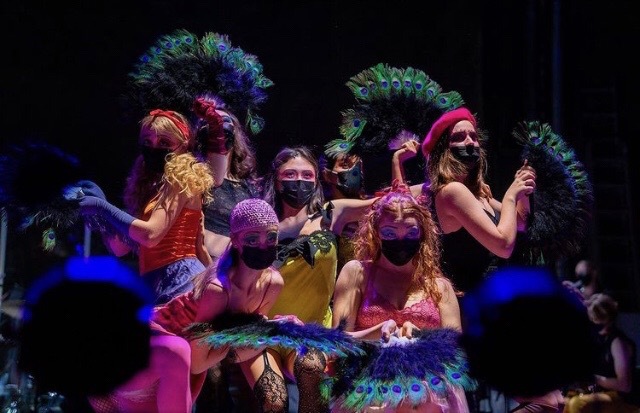Cabaret marks the first in-person musical at Yale in more than a year
Audiences learn of two love affairs: the passionate love of Cliff Bradshaw, an American writer, with Sally Bowles, a British cabaret singer, and the sweet romance of Herr Schultz, a Jewish grocer, with Fräulein Schneider, a local landlady.

Courtesy of Reina Bonta
From the velvet seats of University Theater, an undercurrent of anticipation hums in the crowd as last minute walk-ins shuffle to their seats and the main lights dim. A disembodied voice comes over the speaker, announcing that the show is about to begin, quieting the last of the whispers and the flipping of program pages. As a flamboyant and inviting Emcee — Jordi Bertrán Ramírez ’24 — waltzes on stage, the audacious brass of the band kicks in and “Cabaret” begins.
What follows is a whirlwind — fantastical at some moments and startlingly somber in others. “Cabaret” follows the story of the attendees and attendants of the Kit Kat Klub in 1929 Berlin, a hedonistic extravagance housing a vibrant bunch of salacious dancers, hosts and hostesses. Audiences learn of two love affairs: the passionate love of Cliff Bradshaw, an American writer, with Sally Bowles, a British cabaret singer, and the sweet romance of Herr Schultz, a Jewish grocer, with Fräulein Schneider, a local landlady. The characters’ relationships, including those with the many citizens, sailors and dancers that frequent the Klub, drive the play and contextualize Germany’s eventual descent into facism. As the Nazi party rises to power, characters are forced to make decisions about how they choose to confront antisemitism and hate.
Ava King ‘24, the show’s producer, noted that “Cabaret” was selected “topically for the current moment we’re in.”
“One of the themes of the show is as tensions rise, [characters are] forced to wake up and realize that the party’s over and they’ve been complicit in the face of facism,” King said. “It reminds us of the importance of keeping your eyes open and the consequences of apathy in the face of prejudice, ignoring the negative signs in favor of continuing the party.”
The musical is filled with elaborate choreography, as dancing is central to both the themes of the play and the narrative itself. Bertrán Ramírez noted their performance was “not only very physically demanding, but also very emotionally demanding,” as the Emcee undergoes a character shift between acts one and two. The character becomes more subdued and morose, marking the shift in tone for the whole play from one of playful ditziness to that of willful and harmful ignorance as Nazis explicitly appear.
For the role of Emcee, Bertrán Ramírez drew inspiration from both Bob Fosse, who directed the 1972 “Cabaret” movie, and 80’s drag queens — molding and meshing previous Emcees and their own historical research to make a unique character. Bertrán Ramírez “wanted to perform as an Emcee for 2021,” they said.
Audience member Zoe Mohaupt ’25 came to the show having already seen the Bob Fosse movie. She noted that viewing the musical in person was a completely different experience, but was still surprised at the overt Nazi imagery displayed on stage.
“It was all very poignant — the image carries a lot of weight,” Mohaupt said. “Seeing the scenes of happiness with the Nazi backdrop made the characters feel almost condemnable.”
At the end of the show, Mohaupt remarked that “it felt almost wrong to clap. It really made you think about your subjectivity.” Bertrán Ramírez, however, said that “it was the only way to do the show justice. Otherwise, it would be doing a disservice to the historical period and the script.”
“Cabaret” is also the first in-person musical performed at Yale since the start of the pandemic. King said she was excited about this “big return to in-person theater.”
“The team ultimately wanted [“Cabaret”] to be a celebration of this return, a celebration of live performance that we haven’t gotten to have over the pandemic,” King said.
King added that an exciting aspect of the performance was the fact that a large number of the cast and crew are first-years and sophomores, some of whom are getting their first taste of the dramatic arts through this musical. While performing with masks is, of course, “not ideal,” Bertrán Ramírez emphasized that “it is a small price to pay for the ability to perform live.”
“Cabaret” is unique in its constant contradictions — from provocative sequined lingerie to muted, austere coats and suits, from a confident Emcee transforming into a broken boy, from a quixotic wonderland to the horror of Nazism outside the Klub’s bubble. For a play that, with its soundtrack, asks first, “Who cares, So What?”, “Cabaret” also poses a very real question: “What Would You Do?” In the face of hate, of prejudice, of Nazis, this question challenges the characters and the audience to reflect on their own actions.
In a sea of apples and pears, one could say that the cast and crew of “Cabaret” are pineapples — the same term that Fräulein Schneider and Herr Schultz use to describe uniqueness in the song “It Couldn’t Please Me More.”
“Cabaret” is showing at the University Theatre on Friday, November 19th at 2 p.m. and 8 p.m., with a final performance on Saturday, November 20th at 8 p.m. Tickets are available on the Yale Dramat’s website.







